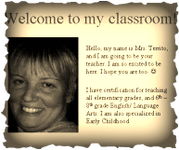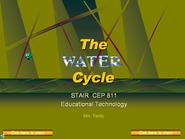Andrea Territo's Online Portfolio

Technology either has to be invented or adopted.
~Jared Diamond~
~Jared Diamond~
Introducing... The Teacher

This PowerPoint presentation serves as a digital introduction to the teacher - ME! I envision this playing on an interactive whiteboard in my classroom during an open house/meet-the-teacher night. This information would then be available on my website as parent resource throughout the school year.
StAIR (Stand Alone Instructional Resource) Project

This is a stand alone instructional resource on the water cycle. Power Point is used for students to explore the basic concepts of the water cycle through exploring slides. Content description and a quiz are the basis of this resource. This serves as a fun and interactive way to teach students about the water cycle.
Digital Footprint

A digital footprint is a collection of activities and behaviors recorded when an entity (such as a person) interacts in a digital environment. It may include the recording of activities such as system login and logouts, visits to a web-page, accessed or created files, emails and chat messages. It'll teach students to be very conscious of where they go and what they do with technology/on the internet.
Educational Technology Course Adventures of Andrea Territo
SPRING 2011
CEP 807: Capstone in Educational Technology
Professors: Denise Leach, Chris Shaltry, Penny Thompson, Dr. Koehler
Participants learn perspectives on educational technology, current theories, research findings, and methods of design and evaluation.
FALL 2010
TE 846: Accomodating Differences in Literacy Learners
Professor: Guofang Li
Participants study the developmental processes, instructional practices, and assessment principles that contribute to effective learning of reading and writing.
SUMMER 2010
CEP 882: Socio-Emotional Development of School-Age Youth
Professor: Cary Roseth
Participants learn to understand deeply moving experiences in three ways: (a) reading a broad range of thoughtful writing on topics ranging from education, psychology, philosophy, and the arts; (b) learning from people who make a living creating compelling experiences for others. This group includes not only successful teachers, but also filmmakers, playwrights, writers, artists, advertisers, computer game designers, and others; and (c) seeking out, experiencing, and reflecting on compelling experiences.
SUMMER 2009
CEP 822: Approaches to Educational Research
Professor: Dr. David Wong
Participants learn alternative methods of educational research, identifying researchable problems in education and developing a research proposal; applications of descriptive and inferential statistics for analyzing and critiquing published studies.
SPRING 2009
CEP 815: Technology and Leadership
Professor: Leigh Wolf
Participants learn professional development strategies, project management, planning and evaluation; relationship building; Ethical and social implications of technology integration.
CEP 800: Psychology of Learning in School/Other Settings
Professor: Cary Roseth
Participants study learning as an active, socially-mediated construction of knowledge in school, home, community, and work settings; what is learned, how it is taught and learned, and what learners bring to the setting.
FALL 2008
CEP 820: Teaching K-12 Students Online
Professor: Robin Dickson
Participants learn strategies for constructing and implementing online curricula aimed at k-12 students.
SUMMER 2008
CEP 812: Applying Educ. Technology to Problems of Practice
Professor: Carolyn McCarthy
Participants will develop, present, and evaluate potentially fundable plans for the implementation of technology in educational/training settings.
SPRING 2008
CEP 811: Adapting Innovative Technologies to Education
Professor: Carolyn McCarthy
Participants learn to apply instructional principles and methods to educational problems; to develop hypermedia applications including Web-based materials, for use in a professional setting.
CEP 810: Teaching for Understanding with Computers
Professor: Susan Way
Participants will learn to use and evaluate computer-based tools in educational environments.
